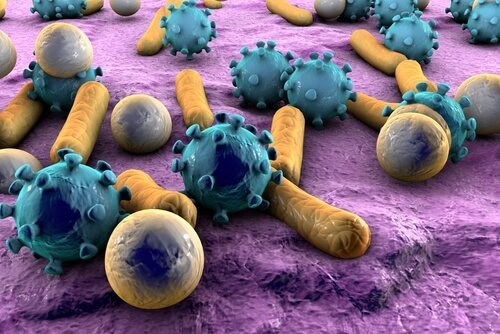
The probiotic L. johnsonii has shown promise as a supportive measure in people with H. pylori infections, while new research indicates potential for gut health, immunity, allergies, and skin health. Read on to learn more.
What is Lactobacillus johnsonii?
Lactobacillus johnsonii is a lactic acid bacterium that resides in the human gastrointestinal tract where it aids in polysaccharide and protein digestion and also generates a variety of nutrients, including vitamins and short-chain fatty acids. L. johnsonii also plays a role in the fermentation and preservation of various food items.
Health Benefits of L. johnsonii
L. johnsonii probiotic supplements have not been approved by the FDA for medical use and generally lack solid clinical research. Regulations set manufacturing standards for them but don’t guarantee that they’re safe or effective. Speak with your doctor before supplementing.
Possibly Effective For
1) H. pylori
L. johnsonii was inversely associated with H. pylori colonization in 621 children [1, 2] and in 12 asymptomatic volunteers [3].
Fermented milk containing L. johnsonii co-administered with antibiotics was shown to have a favorable effect on H. pylori gastritis in 50 volunteers [4].
During the early infection stages, administration of L. johnsonii attenuated H. pylori-induced gastritis in mice [5].
Both live and heat-killed L. johnsonii inhibited the growth of H. pylori in mice, where they also suppress gastric acid secretion [6].
Insufficient Evidence For
The following purported benefits are only supported by limited, low-quality clinical studies. There is insufficient evidence to support the use of L. johnsonii probiotics for any of the below-listed uses. Remember to speak with a doctor before taking L. johnsonii probiotics, and never use them in place of something your doctor recommends or prescribes.
2) Gut Microbiota
Fermented milk with L. johnsonii increased total Bifidobacteria and Lactobacilli and decreased lecithinase-positive Clostridium in 22 women [7].
L. johnsonii intake increased the populations of C. histolyticum, Lactobacilli, and Bifidobacteria, and decreased those of F. prausnitzii in 8 volunteers [8].
3) Immunity
Fermented milk containing L. johnsonii reduced the rate of infections in 24 elderly, hospitalized patients [9].
L. johnsonii helps recover nutritional status and systemic immune responses in aged mice [10].
L. johnsonii inhibits the growth of Helicobacter pylori, Escherichia coli, Salmonella Typhimurium, and Clostridium difficile in laboratory experiments [6].
4) Allergies
The addition of L. johnsonii to levocetirizine improved perennial allergic rhinitis in 63 children [11].
5) Skin Health
L. johnsonii significantly inhibited the development of UVA-induced skin lesions in 60 patients [12].
L. johnsonii suppressed dermatitis and scratching and reduced epidermal hyperplasia and infiltration of inflammatory cells in mice [13].
L. johnsonii administered in the weaning period inhibited atopic dermatitis-like lesions in mice after maturation, possibly by modulating or accelerating the gut immune response [14].
Animal & Cell Research (Lacking Evidence)
No clinical evidence supports the use of L. johnsonii probiotics for any of the conditions listed in this section. Below is a summary of the existing animal and cell-based research, which should guide further investigational efforts. However, the studies listed below should not be interpreted as supportive of any health benefit.
6) Diabetes
L. johnsonii inhibited hyperglycemia reduced the elevation of blood glucose and glucagon levels in diabetic rats [15].
L. johnsonii delayed or inhibited the onset of type 1 diabetes in diabetes-prone rats [16, 17].
L. johnsonii inhibited insulin resistance in mice [18].
7) Blood Pressure
L. johnsonii lowered blood pressure in rats [19].
8) Liver Disease
L. johnsonii protects mice with non-alcoholic fatty liver disease (NAFLD) from liver steatosis and liver cell death [18].
9) Vaginal Infections
L. johnsonii inhibits G. vaginalis-induced vaginosis in mice [20].
Mechanism of Effect
In cell and animal studies, researchers have observed that L. johnsonii:
- Decreased IL-1β, IL-6 [20], IL-4 [21] and IL-8 [5].
- Increased IL-10 [20].
- Increased Th17 [17].
- Increased COX2 [16, 20] and claudin [16].
- Decreased TNFα [20, 18, 9], C-reactive protein [18] and iNOS [16, 20].
- Inhibited NF-κB [20].
- Decreased GPX1, GR, CAT [16], ACACA, FAS, and PPAR-γ [18].
- Both increased [21] and decreased [16] IFN-γ.
- Increased blood Hb, serum albumin [9], and blood phagocytic activity [9].
- Increased IgA [22] and IgG [10] and decreased IgE [21].
- Increased CD8(+) T cells [10].
- Lowered CD86 [23].
Safety
Probiotics are generally considered safe but should be avoided in patients with organ failure, immunocompromised status, and dysfunctional gut barrier mechanisms. To avoid adverse effects and unexpected interactions, talk to your doctor before using L. johnsonii probiotics.

